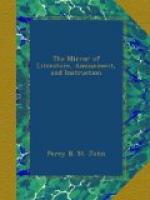It would appear that he had, in process of time, got better acquainted with his sweetheart at Maybole Fair, for he married her. It was on this occasion that he rented the Shanter farm, which, with the assistance of his father-in-law, he stocked and furnished. But fortune went against him:
“His cattle died, and blighted was his corn;”
and an unfortunate friend, for whom he had become security for 150_l._, failed. Under such a load of ill, he, like many others, sought for consolation in the “yill cups;” and any errand which served as a pretext to visit the town of Ayr, renewed his worship to the “inspiring, bold John Barleycorn;” and he usually returned, like the Laird of Snotterston,
“O’er a’ the ills o’ life victorious.”
But Thomas had many a domestic squabble. His wife, naturally not of the sweetest temper, was doubly soured by the misfortunes of the world, and the dissipation of her helpmate; and often when Tam
“Was gettin’ fu’ and unco happy,”
she sat at home,
“Gathering her brows like gathering
storm,
Nursing her wrath to keep it warm.”
She, like too many in that district at that time, was very superstitious. Thomas took her by the weak side, and usually arrested her “light-horse gallop of clish ma-claver” by some specious story of ghost or hobgoblin adventures, with which he had been detained.
He had now got into such a continued state of dissipation and irregularity, that he was obliged to leave the farm to the mercy of his creditors, and opened a small public-house, at the end of the old bridge on the water of Doon. It was while he was here that Tam O’Shanter made its appearance. A manuscript copy was sent to Thomas, by post, with this motto—
Change the name, and the
Story may be told of yourself.
The celebrity of the poem brought numbers to his house, and he sold a great deal. But his spirit could not brook the brutal taunts and jeers which every day he was obliged to bear from his customers. He left off business, and commenced labourer, at which he continued till he got an offer of a situation as overseer of hedges, on the large estate of Castle Semple, at that time belonging to William M’Dowall, Esq., M.P. for Renfrewshire, which he accepted. With short intervals, he remained there till the day of his death. He was of such a character, that he considered no man, or class of men, his superior, and no man his inferior.
Feeling the infirmities of old age approach, Mr. Harvey placed him at his west gate, as gate-keeper, where he fell into a lingering disease, which soon put a period to his mortal career. As he had no friends nor relations (his wife having died about two years before) Thomas had never cared for to-morrow: he was destitute of the means to support himself during his illness. The night before he died, he called for a half-mutchkin of whisky; and (as an acquaintance




